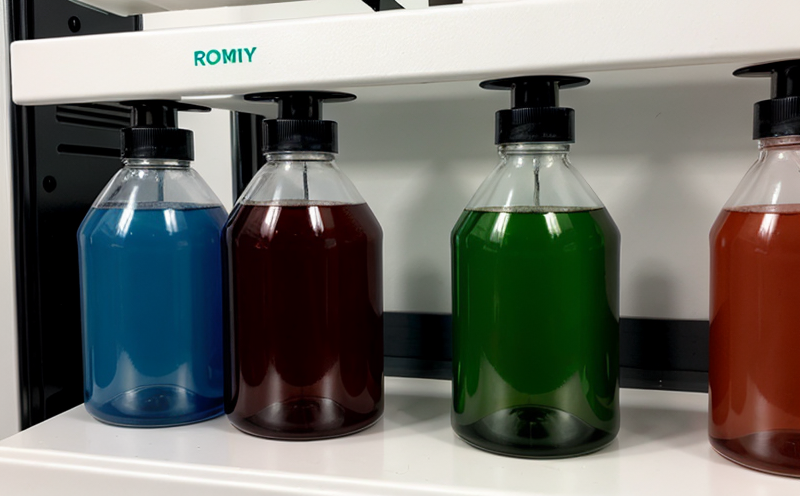ISO 1628 Viscosity Number Testing of Polymers
The ISO 1628 standard pertains to viscosity number testing, a crucial parameter in assessing polymer properties. The viscosity number is defined as the ratio of a polymer's weight to its solution's specific gravity at a specified temperature and concentration. This test provides essential insights into the molecular weight distribution, structure, and chemical nature of polymers. Understanding these characteristics allows for precise formulation, optimization of processing conditions, and quality control in industries such as plastics manufacturing, pharmaceuticals, and coatings.
Viscosity number testing is particularly important when dealing with synthetic resins or polymers that exhibit a wide molecular weight distribution (MW). The test helps to identify the presence of low molecular weight chains which could indicate potential issues during processing. For instance, in the plastic industry, high viscosity numbers can lead to improved flowability and processability, while lower values might suggest a need for different additives or formulations.
The procedure outlined in ISO 1628 involves dissolving a known mass of polymer in a solvent at a specified temperature and concentration. The solution's specific gravity is then measured using a hydrometer or densimeter. The viscosity number is calculated as the weight of the polymer divided by the specific gravity of the solution. This calculation yields an indicative measure that helps in comparing different polymers or batches within the same material.
Accuracy and precision are paramount in viscosity number testing. Deviations can arise from improper sample preparation, incorrect solvent choice, or variations in temperature. Therefore, it is essential to follow the ISO 1628 guidelines meticulously. The choice of solvent must be appropriate for the polymer type; common solvents include tetrahydrofuran (THF) and dimethylformamide (DMF). The testing environment should also be controlled to ensure consistent results.
The significance of viscosity number testing extends beyond laboratory settings into real-world applications. In the pharmaceutical industry, for example, understanding a polymer's viscosity can impact drug delivery systems where solubility and flowability are critical factors. Similarly, in coatings manufacturing, the viscosity number helps tailor formulations to achieve desired film properties.
Quality managers and compliance officers rely on such tests to ensure product consistency and adherence to regulatory standards. R&D engineers use these data points to innovate new products or improve existing ones by optimizing polymer structures for specific performance requirements. Procurement teams benefit from this information when selecting suppliers, ensuring that the polymers they purchase meet quality expectations.
Given its importance in various sectors, it is evident why ISO 1628 viscosity number testing remains a cornerstone of polymer analysis. By providing quantitative data on polymer properties, this test supports informed decision-making across multiple industries.
Why It Matters
The ISO 1628 Viscosity Number Testing is pivotal for ensuring the quality and performance of polymers in diverse applications. Accurate viscosity number measurements influence processability, product stability, and final properties. Here’s why this test matters:
- Process Optimization: Understanding a polymer's viscosity helps optimize processing conditions such as temperature and pressure to achieve desired flow characteristics.
- Quality Control: Viscosity number testing ensures consistency in product quality, which is essential for maintaining brand reputation and customer satisfaction.
- Innovation: By providing insights into polymer structure, this test supports R&D efforts aimed at developing new materials with enhanced performance attributes.
- Regulatory Compliance: Adherence to international standards like ISO 1628 ensures compliance with industry regulations and safety requirements.
- Supplier Evaluation: Viscosity number data enables procurement teams to evaluate the quality of polymers supplied by different vendors, ensuring that only high-quality materials are used in production.
- Environmental Impact: By improving process efficiency and product performance, this test contributes to more sustainable manufacturing practices.
- Risk Mitigation: Early identification of potential issues through viscosity number testing can prevent costly mistakes or product recalls later on.
Eurolab Advantages
At Eurolab, we pride ourselves on delivering accurate and reliable ISO 1628 Viscosity Number Testing services. Our advantages include:
- Expertise: Our team of chemists and engineers is well-versed in polymer science and has extensive experience conducting this test.
- State-of-the-Art Facilities: We utilize advanced instrumentation to ensure precise measurements and reproducible results.
- Comprehensive Reporting: Our reports are detailed, providing not only the viscosity number but also recommendations for further testing or process adjustments based on our findings.
- Custom Solutions: For unique polymer types or complex formulations, we offer customized testing protocols tailored to meet specific client needs.
- Rapid Turnaround: We understand the importance of timely results and strive to deliver reports within a few business days.
- Confidentiality: Your data is kept secure, ensuring that sensitive information remains protected.
Our commitment to excellence ensures that clients receive high-quality services that contribute to their success in the market.





